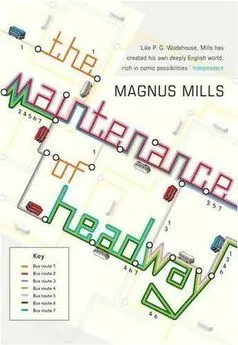Magnus Mills - The Maintenance of Headway
- Название:The Maintenance of Headway
- Автор:
- Жанр:
- Издательство:Bloomsbury UK
- Год:2009
- ISBN:нет данных
- Рейтинг:
- Избранное:Добавить в избранное
-
Отзывы:
-
Ваша оценка:
Magnus Mills - The Maintenance of Headway краткое содержание
It's a matter of procedure,' I explained. 'Strictly for the record. You don't get sacked from this job unless you did what Thompson did.' 'What did he do then?' 'We never mention it.' In Magnus Mills' brilliant short novel he transports us into the bizarre world of the bus drivers who take us to work, to the supermarket, to the match and home again. It is a strange but all too real universe in which 'the timetable' and 'maintenance of headway' are sacred, but where the routes can change with the click of an inspector's fingers and the helpless passengers are secondary. The journey from the southern outpost to the arch, the circus and the cross will seem as familiar as your regular route, but then Magnus Mills shows you the almost religious fervour which lies behind it, and how it is fine to be a little bit late but utterly unforgivable to be a moment early. 'To write one unique book is a rare achievement. The ability to produce several is truly special.' Independent
The Maintenance of Headway - читать онлайн бесплатно полную версию (весь текст целиком)
Интервал:
Закладка:
“Do you think he was referring to Mick Wilson?” asked Jeff.
“Probably.”
“And others of the same stamp,” said Davy.
“Here comes Edward,” said Jeff.
In the few moments since Breslin’s departure, Edward had entered the canteen. He purchased four mugs of tea before taking his place at the table.
“What was Breslin doing up here?” he enquired. “I’ve just passed him on the stairs.”
“Not sure really,” I answered. “He seemed to be having an introspective moment.”
“Oh yes?”
“Casting doubts on his own authority.”
“Really?”
Edward stirred his tea thoughtfully.
“He was questioning the maintenance of headway,” said Davy.
“Well, well, well,” said Edward. “Heresy.”
“I thought he was just calling for moderation,” said Jeff. “After all, buses have to be separated to some extent.”
“They can’t be separated,” Edward replied. “The authorities have been trying to separate buses for half a century, and the result has always been abject failure. It’s a known fact. When buses come, they come not single spies but in battalions.”
“Gravitational attraction,” I remarked. “Buses are drawn naturally into clusters.”
“Correct,” said Edward. “The most common grouping arises from the so-called Three Bears syndrome: one bus running early, one running late, and one running exactly on time. In consequence, three run together. There are, however, many other combinations.”
“Talking about running early,” said Davy. “Has anybody seen Jason recently?”
“No,” I said. “I haven’t.”
“Nor me,” said Jeff. “Why?”
“I had a nice little duty swap lined up for him,” said Davy, “but his name seems to have disappeared off the rota.”
“What?” I said. “Disappeared completely?”
“Yep.”
This piece of news triggered a debate about what might have become of Jason; and Breslin’s recent visitation was swiftly forgotten.
“Jason was quite interested in the articulated bus,” I said. “Perhaps he’s applied for a transfer.”
“But most of those buses are still in the factory,” said Edward. “It’s going to take a while till they come off the production line.”
“Maybe he got the sack,” suggested Jeff.
“You don’t get the sack from this job,” said Davy.
“What about Thompson?” I said. “He got the sack.”
“Oh yes!” retorted Davy. “You’re always mentioning this Thompson who no one else can remember. Go on then! Tell us why he got the sack.”
“He lost patience with his people,” I replied. “They were complaining he was late when he was actually early, so he drove his bus straight into the vehicle wash and switched the water on.”
“Full of people?”
“Yes,” I said. “All the windows were open.”
“Good grief,” said Edward. “No wonder they sacked him.”
“Dismissed on the spot,” I said. “Hence the expression ‘An early bath for Thompson’.”
“I’ve never heard that expression,” said Davy.
“You will,” I said. “You will.”
§
The bunching of buses posed a question for the authorities that simply would not go away. It remained the Board of Transport’s worst headache. The problem was endemic to the extent that there were several collective nouns for buses. These varied according to circumstances. Edward explained them to Jeff and me one day during the mid-morning lull. “It all depends on the perspective of the observer,” he began. “For example, whereas drivers might take part in a ‘convoy of buses’, the officials would refer to it as a ‘liberty of buses’. The passengers, meanwhile, view it differently again. For buses nobody wants the correct term is a ‘procession of buses’. When all the buses fly past without stopping it’s a ‘skein of buses’; and then, of course, there’s the most prevalent form of all, namely, a ‘dearth of buses’, which is self-explanatory.”
“What about a ‘fleet of buses’?” proposed Jeff.
“That’s for commercial usage only,” Edward replied. “You can also have a ‘collection of buses’ belonging to private enthusiasts.”
“Doesn’t the weather also have some bearing on the matter?” I asked.
“You’re quite right,” said Edward. “In wintry conditions it’s a ‘sludge of buses’. On sunny days, by contrast, you might see a ‘mirage of buses’ fading into the distance.”
At that moment the canteen doors swung open and Davy burst in looking very agitated.
“I’ve had it up to here with Mick Wilson,” he said, indicating his chin. “I don’t know how much more I can take.”
Quickly he ordered breakfast at the counter before coming over to recount his troubles.
“Seven o’clock this morning,” he began, “I was down in the shed minding my own business, getting my bus ready. I had my seat exactly how I like it; all my mirrors lined up properly; checked the water; everything. I was just settling in when all of a sudden Mick Wilson appeared. He took one look at me and came marching over. ‘Right,’ he said, all imperious like. ‘I need this bus straightaway: out you get!’ ‘Wait a minute,’ I said, ‘I’ve just spent ten minutes getting it ready’. ‘Doesn’t matter,’ said Mick. ‘You’ll have to see the engineers for another one.’ Then he just commandeered my bus and drove off without so much as a ‘bye’ or ‘leave’.”
Edward gave Davy a penetrating look. For a moment I thought he was about to correct his diction, but then for some reason he changed his mind.
“That must have made you late,” he said.
“Course it made me late,” Davy replied. “You know how I hate being late.”
We all sympathised: we all hated being late.
“It seems our predictions about Mick have turned out to be true,” said Edward. “He’s only been an inspector for a few weeks and already it’s gone to his head.”
“I wonder why he wanted the bus so urgently?” said Jeff.
“Oh,” I said. “I think I heard Greeves mention there were too many buses up the cross and not enough down the outpost. Mick must have overreacted to the situation.”
“So what’s the future going to hold if he carries on like that?” said Davy. “It’ll be untenable.”
“You needn’t worry about the future,” said Edward. “Roadside officials are being phased out.”
“How come?”
“There’s going to be a satellite launched in the next few months. Henceforth, the progress of buses will be monitored from outer space.”
“You’re joking,” said Davy. “The Board of Transport couldn’t launch a frying pan into space, let alone a satellite.”
“It’s not the Board launching it,” Edward explained. “It’s an international project, connecting every bus service in every country. The Board of Transport is just one of a number of subscribers.”
“Funny, isn’t it?” said Jeff. “I can’t imagine them having buses in other countries. Only this one.”
“Well, I can assure you there are buses on all five continents,” said Edward. “I should know. I’ve studied them.”
“When?”
“During my holidays.”
“You probably know more about buses than the officials,” I remarked.
“Probably,” said Edward. “Though I do try to share my findings.”
“Do they have double-deckers in these other countries?” Davy enquired.
“In one or two places, yes,” answered Edward. “Their bus of preference, however, is the single-decker.”
“Didn’t they invent the articulated bus?”
“Yes they did: they’re pioneers in innovation; but to tell the truth, the general picture is entirely different.”
“How do you mean?”
“There’s no ‘presumption of lateness’ in other countries,” said Edward. “Over here the people presume we’re late when, in fact, we’re much more likely to be early. Our foreign counterparts, on the other hand, are always presumed to be on time.”
“Blimey!” exclaimed Davy.
“I heard recently they have a 97 per cent efficiency rating, compared to 42 per cent in this country.”
“Well, how are we going to compete with them?” I asked.
“Fortunately, we don’t have to compete with anybody,” Edward replied. “They run their buses over there and we run ours over here. There’s no direct competition.”
“That’s alright then.”
“Buses will never change in this country,” he continued. “They’ll never get better and they’ll never get worse: they’ll simply remain the same forever. Oh, certain attempts have been made in the past to bring about improvements. The maintenance of headway was one such crusade, and there have been many others. Yet whatever measures are put in place, in this country they ultimately fail. True, you can calculate the movements of buses just as you can the motions of the stars and planets. What you cannot calculate, however, is the behaviour of people. Shall I go on?”
“You might as well,” I said. “Now you’ve started.”
“I’m talking about people who hail buses they don’t want,” said Edward. “People who haven’t got the correct fare. People who get on buses just because they happen to be loitering near a bus stop. People who clamour to get on buses that are already full. People who expect buses to wait for them. People who attempt to ‘hold’ the bus by blocking the doorway. People who ring the bell for no good reason. People who try to change buses mid-stream. Argumentative people. People who cross the road when they shouldn’t. Cyclists. Cabbies. People who park their vans in bus lanes. People who repair water mains inadequately. People whose occupation is emptying dustbins. The people in charge of traffic lights. And finally, of course, people who drive buses for a living.”
I glanced at my watch, stood up and walked away from the table. It was time for me to go. Edward was still delivering his exposition as I descended the stairs and went in search of my next bus.
He was quite correct. It was people of one kind or another who ultimately disrupted the bus service. Sometimes I even wondered whether they wanted buses in the first place: I was once driving up the rise towards the common with about forty people on board when suddenly my bus ran out of diesel and stopped. Without exception, the entire load of passengers got out of the bus and walked away, all in different directions. As I watched them disperse I was unable to answer the question: what are we here for?
Nevertheless, Edward’s extensive theories dealt only with one side of the coin. The other side concerned the matters raised by Breslin. He, too, was correct in his own way. The entire bus network was an enormous apparatus designed to run like clockwork. Despite everyone’s best efforts, occasionally the mechanism became clogged up and needed a prod. This, he argued, was the purpose of the officials. It was reassuring to know that he thought of himself not as a tyrant but as a lubricating agent. However, I could foresee little change in that department either.
§
My bus arrived at the takeover point precisely on time. Now all I had to do was drive it down to the outpost, up to the cross, then back here, and my duties for the day would be complete. With this in mind I sallied forth, paying little regard to the exact details of the schedule. As long as I didn’t get too close to the bus in front, I reasoned, then headway would be maintained (more or less).
I was mildly surprised, therefore, when I reached the southern outpost and a figure appeared on the pavement, urgently flagging me down.
Читать дальшеИнтервал:
Закладка:





![Джеймс Купер - Пионеры, или У истоков Саскуиханны [The Pioneers, or The sources of the Susquehannah]](/books/1066142/dzhejms-kuper-pionery-ili-u-istokov-saskuihanny-t.webp)




